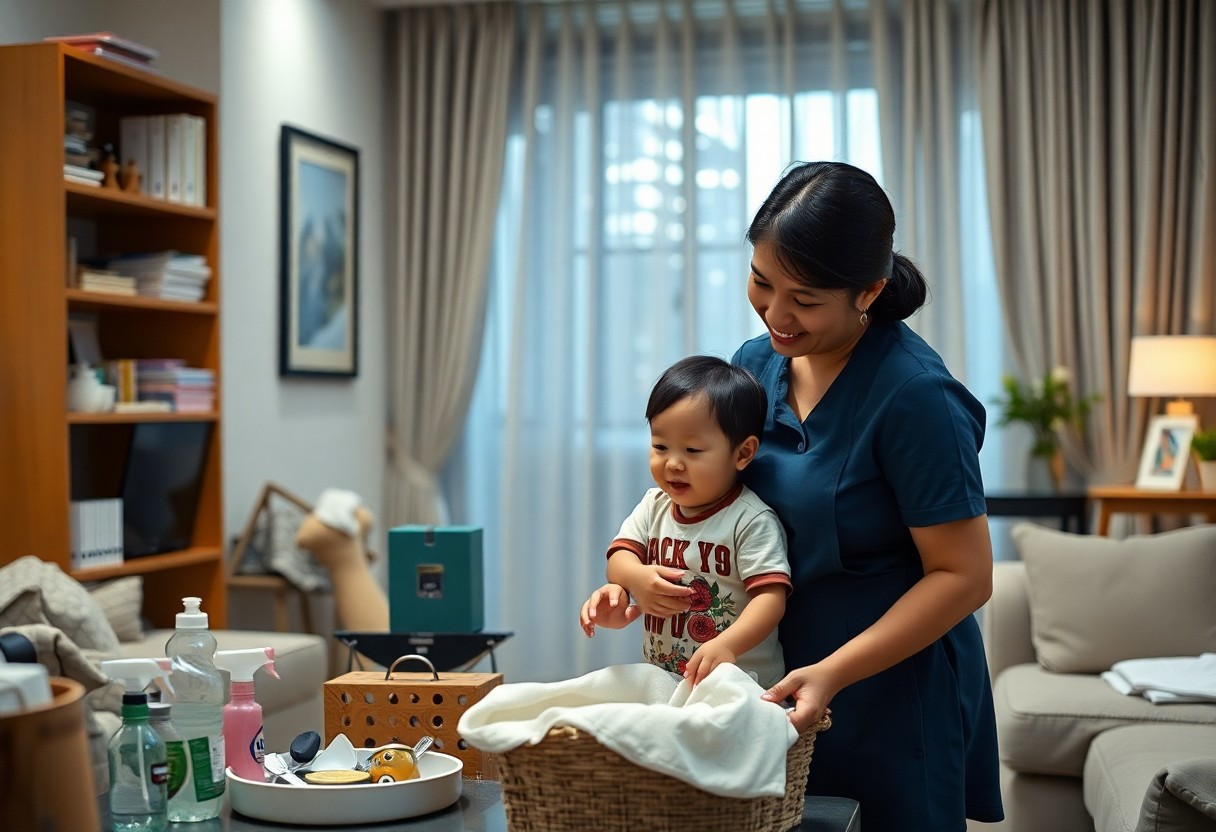There’s a growing interest in hiring Filipino nanny-housekeepers due to their unique blend of childcare and household management skills. As you consider this option for your family, it’s important to understand the specific responsibilities these professionals take on and the benefits they can bring to your home. From providing exceptional care for your children to maintaining a clean and organized living space, a Filipino nanny-housekeeper could be the right choice for enhancing your family’s daily life.
Key Takeaways:
- A Filipino nanny-housekeeper provides a dual role that encompasses childcare, household management, and maintenance, ensuring a safe and organized environment for families.
- The responsibilities of a Filipino nanny-housekeeper include supervising children, preparing meals, cleaning the house, and assisting with laundry and shopping tasks.
Understanding the Role of a Filipino Nanny-Housekeeper
While hiring a Filipino nanny-housekeeper can significantly improve the dynamics of your household, it’s necessary to understand their multifaceted role. This combination of caregiver and domestic worker ensures that your home runs smoothly while also providing compassionate care for your children.
Definition of a Nanny-Housekeeper
Along with typical childcare duties, a nanny-housekeeper performs various household tasks such as cleaning, cooking, and laundry. This hybrid role allows you to maintain a well-organized home while ensuring the emotional and physical well-being of your family members.
Cultural Background of Filipino Caregivers
Nanny-housekeepers often embody the values inherent in Filipino culture, such as strong family ties and deep respect for elders. This cultural foundation influences their caregiving approach, making them attentive, nurturing, and conscientious about your family’s needs.
Nanny-housekeepers not only bring their skills in childcare and household management but also a cultural understanding that prioritizes respect and kindness. In fact, many Filipino caregivers have undergone extensive training and have experience in various caregiving settings, which equips them to handle diverse situations with ease and compassion.
General Overview of Responsibilities
Understanding the responsibilities of a nanny-housekeeper is vital for a successful working relationship. Key tasks include engaging with your children in educational and recreational activities while ensuring their safety and well-being, alongside managing household chores like cleaning, meal preparation, and laundry.
Plus, having a clear outline of responsibilities can help avoid misunderstandings, ensuring that both you and your nanny-housekeeper have aligned expectations. This clarity allows for a harmonious living environment, where your household is well-kept and your children receive the nurturing they need to thrive.
Key Responsibilities of a Filipino Nanny-Housekeeper
Some of the main responsibilities of a Filipino nanny-housekeeper revolve around managing both childcare and household tasks, ensuring that your home runs smoothly while providing a nurturing environment for your children.
Childcare Duties
Behind each successful Filipino nanny-housekeeper is a strong focus on the wellbeing of your children. This includes activities like preparing meals, overseeing playtime, helping with homework, and maintaining daily routines, all while fostering emotional and physical development.
Household Management
Filipino nanny-housekeepers also take on various household management tasks. They typically handle laundry, meal preparation, cleaning, and organizing your home. This allows you to focus on your personal and professional commitments without worrying about daily chores.
Further, they may help manage household supplies, ensuring that everything from groceries to vital items are stocked. With their attention to detail and reliability, Filipino nanny-housekeepers can bring a sense of organization and cleanliness that enhances your home environment.
Key Communication and Relationship Building
By prioritizing open communication, a Filipino nanny-housekeeper builds strong relationships with both you and your children. This connection is vital for understanding your family’s unique needs and preferences, ensuring everyone feels comfortable and valued.
A well-rounded Filipino nanny-housekeeper not only cares for your children but also nurtures family dynamics. With consistent and honest communication, they can adapt to your family’s routines and expectations, fostering a harmonious household atmosphere that benefits everyone.

Qualifications and Skills Required
Now, to be a successful nanny-housekeeper in a Filipino context, certain qualifications and skills are necessary. These encompass a blend of educational backgrounds, relevant experiences, and necessary skills that enable you to effectively meet the needs of families requiring your expertise.
Educational Background
About education, most Filipino nanny-housekeepers have at least a high school diploma. Some may have further qualifications in child development, early childhood education, or hospitality, which can enhance your ability to care for children and maintain a home.
Relevant Experience
Background in childcare or housekeeping is valuable when becoming a nanny-housekeeper. Many successful candidates have experience working in similar roles, either in personal households or as part of reputable agencies. This exposure helps you understand family dynamics and household responsibilities more effectively.
Skills that you acquire from relevant experiences include hands-on childcare, meal preparation, and household management. The more varied your experiences are, the better equipped you will be to handle different situations, making you a valuable asset to any family.
Essential Skills
Around the necessary skills required for a Filipino nanny-housekeeper, you must possess qualities such as patience, organization, and communication. These skills will help you navigate the complexities of caregiving while managing household tasks efficiently.
This set of skills emphasizes your ability to create a nurturing environment for children while ensuring the home remains tidy and well-managed. By honing these skills, you will not only enhance your employability but also provide families with peace of mind knowing their children and home are in capable hands.
Benefits of Hiring a Filipino Nanny-Housekeeper
For families looking to balance work and home life, hiring a Filipino nanny-housekeeper offers several unique benefits that can enhance your household experience.
Cultural Sensitivity and Understanding
Behind their skill sets, Filipino nanny-housekeepers bring a deep cultural understanding that often aligns with familial values. They are known for their nurturing nature, showing compassion towards both the children and the home’s environment, which can create a harmonious atmosphere that reflects your family’s values.
Cost-Effectiveness
By investing in a Filipino nanny-housekeeper, you often find a more affordable option compared to local hiring alternatives. They typically offer a wide range of services, combining childcare with housekeeping, thus maximizing your investment.
And, since many Filipino nanny-housekeepers are skilled at multitasking, you can save on additional costs that would come with hiring separate individuals for childcare and home management. This cost-effectiveness also extends to reduced hiring and training expenses, as they bring valuable experience and expertise to the role.
Reliability and Work Ethic
Any family that employs a Filipino nanny-housekeeper can attest to their exceptional reliability and work ethic. They understand the importance of maintaining a supportive and organized home environment, ensuring that your household runs smoothly.
Their commitment to their roles often translates into consistent care and a proactive approach to managing household tasks. This dedication not only eases your burdens but also helps establish a stable routine for your family, enhancing overall quality of life.
Long-Term Relationships and Stability
Stability is another key benefit you may experience when hiring a Filipino nanny-housekeeper. These professionals often seek long-term employment, fostering deep connections with your family and creating a familiar environment for your children.
Plus, having a consistent caregiver allows your children to develop trust and rapport, which is crucial for their emotional and social development. This long-term relationship can provide your family with a sense of stability and continuity, creating a nurturing and supportive home environment.
Challenges Faced by Filipino Nanny-Housekeepers
Once again, while working as a Filipino nanny-housekeeper can be rewarding, it also presents various challenges that you may encounter. Understanding these challenges can help you better prepare for your job and create a more positive work environment.
Cultural Adjustment
By moving to a new country, you may face cultural adjustment challenges that require you to adapt to different customs, traditions, and lifestyles. This transition can impact your daily interactions and overall experience.
Communication Barriers
By working in a different country, you might encounter communication barriers that can complicate your job. These can stem from language differences or misunderstandings related to cultural norms.
The language barrier, in particular, can lead to difficulties in understanding instructions, expressing feelings, or communicating effectively with your employers. This may cause frustration on both sides, making it important for you to be patient and open to learning the local language to improve interactions.
Work-Life Balance
To maintain a healthy work-life balance, you must set boundaries and prioritize your well-being. Balancing work responsibilities and personal life can be a struggle in demanding roles like a nanny-housekeeper.
Even as you dedicate yourself to your job, it is important to carve out time for rest and personal interests. Fostering a work-life balance allows you to recharge and maintain enthusiasm for your role, ultimately benefiting both you and your employer.
Finding the Right Filipino Nanny-Housekeeper
To successfully find the ideal Filipino nanny-housekeeper, you must follow a structured approach. This process involves thorough screening, asking pertinent questions during interviews, and understanding the contractual obligations that will safeguard both you and your new employee.
Tips for Screening Candidates
With a large pool of potential candidates, screening is vital to find the best fit for your family. Start by reviewing resumes and applications to identify those who align with your requirements. Consider the following tips:
- Check references from previous employers.
- Evaluate their experience related to your specific needs.
- Look for certifications in childcare or household management.
- Consider cultural compatibility with your family.
- Trust your instincts during initial conversations.
Any candidate that meets these criteria should proceed to the interview stage.
Questions to Ask During Interviews
On entering the interview phase, it’s vital to ask questions that reveal the candidate’s qualifications and suitability. Inquire about their previous experiences, childcare philosophies, and how they handle various household tasks under pressure.
For instance, you might ask about specific scenarios where they managed children in challenging situations, or how they prioritize chores effectively. Delve into their problem-solving skills and adaptability, which are vital attributes for a nanny-housekeeper. Understanding their communication style and what they enjoy about working in a home setting can also shed light on their personality and approach.
Considerations for Employment Contracts
Candidates should be presented with a clear employment contract outlining their responsibilities and compensation to create a structured working relationship. It’s vital to discuss work hours, payment terms, holidays, and duties to ensure mutual understanding.
Employment contracts not only clarify expectations but also protect both parties. Ensure that the contract includes confidentiality agreements and any relevant local labor regulations. These protections create a positive work environment, setting the stage for a successful partnership between you and your nanny-housekeeper.
To wrap up
Conclusively, understanding what a Filipino nanny-housekeeper is and their responsibilities helps you make informed decisions about your household needs. These professionals not only take care of your children but also maintain your home, providing you with invaluable support. By hiring a Filipino nanny-housekeeper, you gain the benefits of their expertise, cultural values, and strong work ethic, ensuring a harmonious environment for your family. Ultimately, investing in their services enables you to focus on your priorities while ensuring your children and home are in capable hands.
